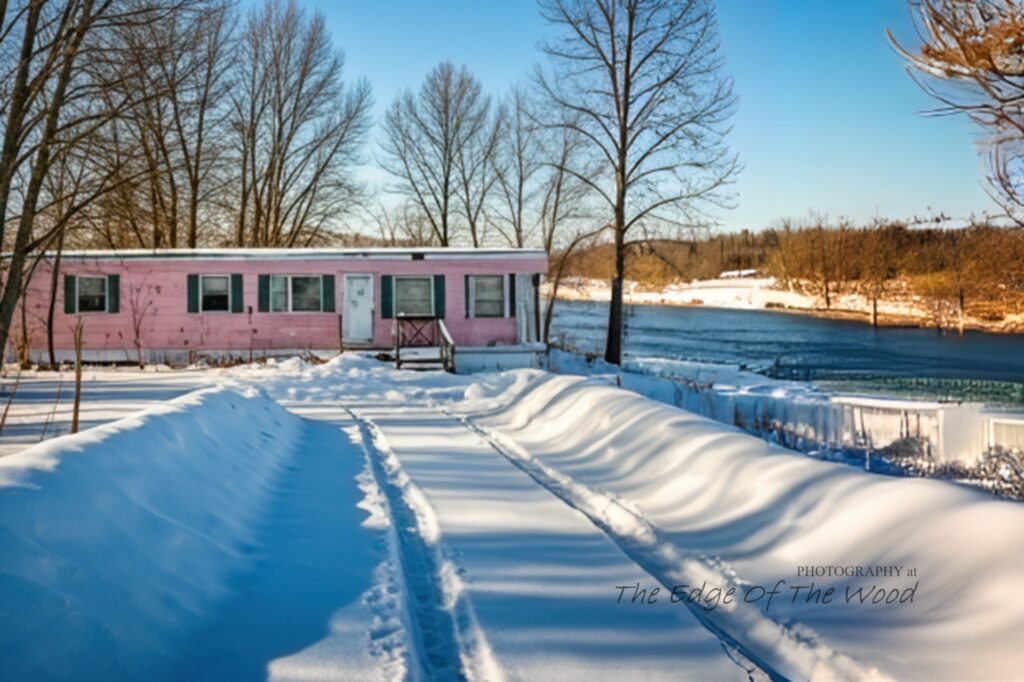
Plowed snowbanks lead to an aged singlewide mobile home at the edge of a snow-covered field near a river. — AI-generated image by John Messeder
(Click the Play arrow to listen to this column.)
A young woman of my earlier acquaintance lived with her two boys in a singlewide parked in an abandoned pasture. The field of weeds and young trees sat alongside a state highway where it paralleled a virtually unnoticed river flowing from the upper reaches of the rural county.
Michelle had been raised even farther upriver, in a community of corn and dairy farmers, although changing diet among their younger customers was cutting into the family income.
She had graduated from high school well up in her class, the first in her family to apply, much less be accepted, to college. She was not certain of a career path, but common wisdom held that spending another four years in school would increase the wages she would earn. The common wisdom did not specify what she would do to earn the increased wages.
It wasn’t so much she wanted off the farm but she knew if she stayed there was little chance she would experience any of the adventures she had encountered in books. Michelle loved to read and deeply wished she could one day see some of the places depicted on those pages.
August after high school graduation found her in the county seat searching for an apartment and a roommate or two to help pay the rent. She had some money she had hoarded to pay for books, and she got a job waiting tables in one of the several restaurants that served the town’s tourist trade. Full of confidence and hope, she started classes, knowing a career would reveal itself in due time.
Then one warm September afternoon by the river with a rugged classmate to whom she had taken a liking … the twins, Robbie and Tom, arrived the second week in June.
Michelle was determined she would raise her new family, and attend classes, though she cut her class load. She knew it would take longer to graduate, but her boys were all-important to her. Besides, their father had transferred to a school Out West shortly after that afternoon by the river, leaving her resources a bit limited.
She found a 15-year-old trailer for rent she could barely afford, and she moved in. Between waitressing and caring for her boys, she had little time to think about college-years recreation, but she had a few friends so life in the pasture was not as lonely as it might have been.
November arrived and the winds of winter began to reveal cracks in the trailer walls, around the windows and doors and wind blew through the floor around the plumbing. Even two waitress jobs would not buy food, pay rent, hire the work needing done to keep Old Man Winter outdoors where he belonged, plus continue school so one day she could get a better job to pay for a better place.
Meanwhile, snow piled up around the mobile home while the State Assembly argued with itself about how to divvy up the money Congress has given it to keep our poorest citizens from freezing to death through winter.
The tax money they grudgingly contribute to Michelle’s heating bill serves to subsidize the excessively high “market price” of the products and, by extension, the incomes of those captains of industry our pols claim (wink-wink!) are so severely under-taxed.
Welfare money, the dollars we taxpayers give to Michelle to help buy food and other necessities, is money companies such as Walmart, Uber, Doordash and Instacart can put in their CEO’s pockets instead of their employees’ paychecks. It is cash we taxpayers contribute to programs such as the Low Income Home Energy Assistance Program, pronounced LIHEAP, which pays energy producers directly, thus avoiding even the charade of who receives the out-of-reach market price of Michelle’s heating oil.
I sometimes wonder what would result if we just cut those welfare programs — action a certain group many of our politicians often recommend — and instead pay the boards of WalMart, ExxonMobil, Chevron, etc. with news photos of starved and frozen families.
Might they be moved to re-price their products so that poor among us can stay warm without using tax money to line the pockets of industry.
On the other hand, maybe every January pick an energy tycoon at random and sacrifice him, or her, in a snow bank.
Text and Images ©2025 John Messeder. John is an award-winning environmental storyteller, nemophilist and social anthropologist living in Gettysburg, PA. He may be contacted at john@johnmesseder.com
